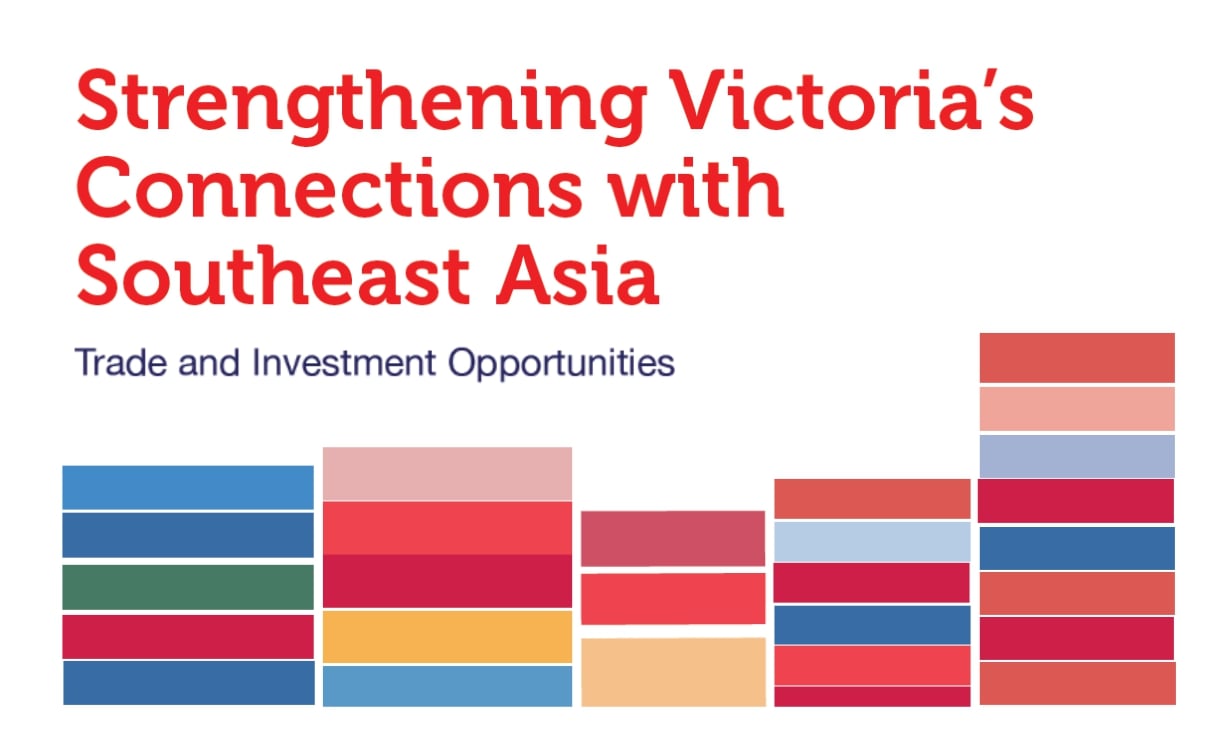In 2022, the Asia Trade and Innovation Hub (ATIH) released a series of three reports with the goal of enhancing the relationship between Victoria and Southeast Asia.
The first report in this series, Strengthening Victoria's Connections with Southeast Asia - Trade and Investment Opportunities, provides a roadmap for business and government as they seek to deepen relationships with Southeast Asian countries and strengthen Victoria's participation in the region following the COVID-19 pandemic.
Led by the Australian APEC Study Centre at RMIT, as an RMIT Asia Trade and Innovation Hub publication, in partnership with the Asia Society Australia and experts from RMIT's College of Business and Law (COBL) and School of Global, Urban and Social Studies (GUSS), this report identifies opportunities and recommendations to boost Victoria's engagement with the countries of Southeast Asia.

Victoria and Southeast Asian countries as regional partners
Victoria stands out among Australia’s states and territories as being well positioned to reap the benefits from its economic complementarity with the Southeast Asian region. Countries across the Association of Southeast Asian Nations (ASEAN) have young, fast-growing and increasingly affluent populations. They have become more digitally sophisticated, demanding higher-quality products and services.
If Victoria can build on the existing trade and investment relationship to help Southeast Asian countries grow their economies and raise the living standards of their people then exciting, new opportunities will open up for the State. But to do so, it needs to continue to build genuine partnerships with Southeast Asian nations – ones that transcend development cooperation, that values the region in its own right, and responds to priority needs in the contemporary post-COVID environment.
This report examines the changed landscape, identifies the new opportunities, and sets out an agenda for government, business and other situations to respond. However, analysis of the opportunities and challenges ahead will remain just that if not matched by businesses willing to take the risks, and by governments that are willing to support them.
Partners for prosperity: The recommendations
Recent developments warrant a fresh approach as to how Victoria trades and invests with countries in Southeast Asia. Now is the time to reinvigorate and strengthen the existing relationship to take advantage of opportunities, mitigate challenges and build engagement to deliver mutual benefits. But to position Victorian business for success in Southeast Asian markets in the new environment requires high-level engagement by both government and business leaders.
Victorian business leaders and policy makers should come together for a high-level discussion to action a roadmap to deepen trade and investment linkages with Southeast Asian countries. Doing so will help Victorian businesses manage risk in the post-COVID trade landscape and contribute to a safer, more prosperous Indo-Pacific region.
Recommendations
1. Lead a new approach to trading after COVID:
- Establish a Victoria – Southeast Asia Taskforce to articulate a fresh approach.
- Determine priority issues for building trade with Southeast Asian markets.
- Identify policies to support Victorian interests at various levels of government.
- Prioritise people to people linkages.
- Lead a wider national initiative.
2. Tap into the digital transformation across the Southeast Asian region:
- Collaborate with Victorian business and researchers to identify key digital policy challenges, opportunities, gaps and needs.
- Provide a platform for dialogue between the private sector and ASEAN policy makers and regulators.
- Link Victorian business to federal initiatives that can help drive regulatory reform to address trade and investment barriers.
3. Support supply chain resilience:
- Support the establishment of ‘supply chain councils’ that bring together the key participants involved in, and concerned with, the operation of GVCs.
- Engage in collaborative dialogue with ASEAN business on approaches to help mitigate the risks of complex supply chains.
- Develop resources to help Victorian SME exporters and importers to understand supply chain choke points.
- Invest in improved infrastructure to support accessible transport pathways.
4. Build investment in the green industries of the future:
- Examine the role State Government can play in initiating private/public sector cooperation to facilitate business with Southeast Asian countries where this sort of private/public decision-making or cooperation occurs.
- Establish a regular dialogue between business and government.
- Support greater collaboration and greater cross-border cooperation on standards for renewable energy in the region.
- Commission research to map out investment barriers and potential areas of opportunity in the green economy.
5. Enhance labour mobility:
- Connect Victorian businesses with initiatives for mutual recognition of professional services and educational qualifications with ASEAN bodies.
- Build on business and cultural exchange programs.
- Help drive federal government initiatives to improve labour mobility for business, students and professionals.